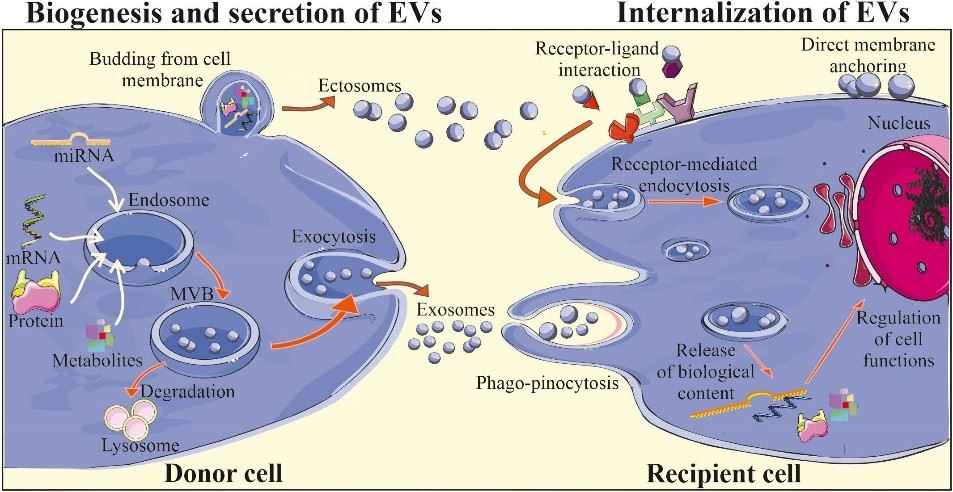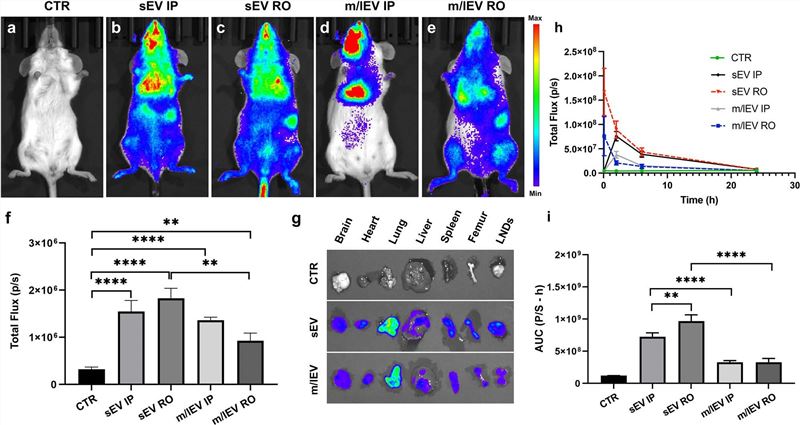Extracellular Vesicle Functional Research and Verification Service
Overview Services Features FAQs
Overview
Extracellular Vesicle Functional Research
Extracellular vesicles (EVs) are an important communication tool between cells, which can deliver proteins, mRNA, miRNA, and other substances to recipient cells, regulate cell behavior and play a role in many physiological and pathological processes such as tumor metastasis, immune recognition, and inflammatory response. play an important role in the process. Therefore, the research on the action mechanism of EV and the treatment of engineered EV is very popular in recent years. To study the function of EV, separate functional experiments at the cell level and animal level are required. Generally, it is necessary to observe whether EVs are taken up by recipient cells or reach target tissues before detecting whether the corresponding phenotypic indicators are changed in recipient cells or tissues. This research process is bound to involve the tracer of EV. In addition, the difficulty and key point of EV function research are that these functional experiments require a large number of EVs to meet the experimental requirements, especially for live animal injections.
Creative Biolabs can effectively solve EV mass production problems and provide customers with effective EV labeling service and the most comprehensive EV functional research services.
Services
Cell Function Research Service for Extracellular Vesicle
Creative Biolabs can strictly control the experimental conditions according to customer needs, and use designated recipient cells (primary cells or cell lines) to conduct functional research on EV in vitro. We can provide customers with the most comprehensive in vitro cell function evaluation services, including cell uptake, cell invasion, cell migration, cell apoptosis, cell proliferation, related gene expression detection, etc., to help customers explain the action mechanism or therapeutic effect of EV in vitro and further support in vivo studies and clinical translation.
In addition, we can also provide 3D cell culture and related phenotypic testing services, which can better simulate the natural environment of cell survival in vivo and show more realistic cell biology and functions. This can really help customers save costs and improve efficiency while better explaining the action mechanism of EV.
 Fig.1 Biogenesis and biological activity of EVs.1.3
Fig.1 Biogenesis and biological activity of EVs.1.3
In vivo Animal Research Service for Extracellular Vesicle
Creative Biolabs has a complete animal pathology experiment platform and rich service experience and can provide the most comprehensive animal models to help customers study the tissue distribution, therapeutic effect, and safety of EV in vivo. Specifically, we can provide animal modeling, EV administration, live imaging of small animals, immunohistochemistry, immunofluorescence staining, target gene detection, and other related animal pathology experimental services. These assays can help customers to elucidate the action mechanism or efficacy of EV in vivo under more realistic conditions to accelerate the translation to the clinic.
 Fig.2 Similar biodistribution and lung tropism of sEVs and m/lEVs derived from metastatic mammary carcinoma 4T1 cells.2.3
Fig.2 Similar biodistribution and lung tropism of sEVs and m/lEVs derived from metastatic mammary carcinoma 4T1 cells.2.3
Features
-
Customized Experimental Design
-
Comprehensive Functional Evaluation
-
Advanced Technology Platform
-
Diverse Selection of Animal Models
Creative Biolabs has been committed to providing overall solutions for EV research. With rich project experience and high-quality technical support, we can provide overall services from experimental design, EV modification, EV extraction, EV identification, EV molecular detection, and EV tracing to in vivo and in vitro functional verification. If you are worried about finding a suitable EV functional verification platform, please contact us immediately to leave your requirements. Our professional scientific research team will reply to you as soon as possible.
FAQs
Q: Our research needs are very specific. Can you provide a customized experimental design?
A: Absolutely! We offer customized experimental design services. We will tailor the most suitable experimental plan for you based on factors such as your research objectives, cell types, and the source of the vesicles.
Q: Can we choose the detection indicators for the experiment ourselves?
A: Yes, you can select specific detection indicators based on your research needs. We can also recommend commonly used functional evaluation indicators based on our extensive experience to ensure that the experimental plan covers the key aspects of functional research.
Q: If we are not familiar with certain experimental methods, can your company provide guidance or suggestions?
A: Our team of experts can provide detailed guidance on experimental methods and offer targeted suggestions during the experimental design phase to help you select the most appropriate techniques and analysis methods.
Q: How should we choose the appropriate experimental model for in vitro and in vivo functional research?
A: The choice of experimental model depends on your research objectives. For example, in vitro research is suitable for the initial screening of extracellular vesicle functions, while in vivo models are better for verifying their effects under specific disease or physiological conditions. Our team can help you evaluate and select the most appropriate model.
Q: Is there a fixed experimental process to follow when designing the experimental plan?
A: Our experimental process is very flexible and can be adjusted according to your specific needs, although we do have some established standard processes.
References
-
Karnas, E.; et al. Stem cell-derived extracellular vesicles as new tools in regenerative medicine- immunomodulatory role and future perspectives. Frontiers in Immunology. 2023, 14:1120175.
-
Perez, GI.; et al. In vitro and in vivo analysis of extracellular vesicle-mediated metastasis using a bright, red-shifted bioluminescent reporter protein. Advanced in Genetics. 2022, 3(1):2100055.
-
Distributed under Open Access license CC BY 4.0, without modification.
For Research Use Only. Cannot be used by patients.
Related Services:

 Fig.1 Biogenesis and biological activity of EVs.1.3
Fig.1 Biogenesis and biological activity of EVs.1.3
 Fig.2 Similar biodistribution and lung tropism of sEVs and m/lEVs derived from metastatic mammary carcinoma 4T1 cells.2.3
Fig.2 Similar biodistribution and lung tropism of sEVs and m/lEVs derived from metastatic mammary carcinoma 4T1 cells.2.3









